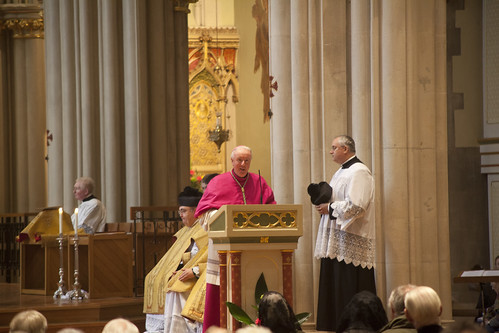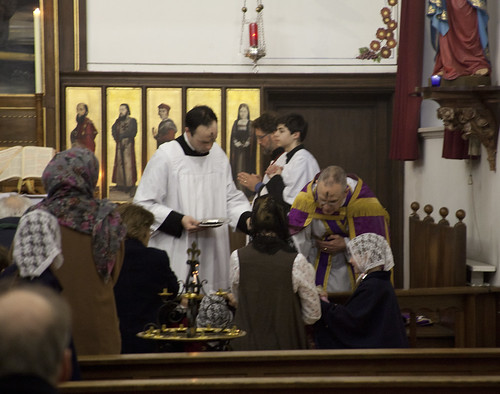 |
| Bishop Egan preaching in his Cathedral at the Traditional Mass. Somehow Loftus was never going to like him much. |
The ludicrous report, which turned out to be false as well as very unflattering towards Pope Francis, that the newly-elected Pope told his Master of Ceremonies 'The carnival is over' has been repeated by Loftus several times, with more or fewer details. Another one, it would seem of Basil's own manufacture, is a phrase torn from its context from a short piece by Bishop Egan after Pope Benedict announced his abdication.
Loftus writes (13th June 2014):
... a closed-minded approach, a refusal to take risks, a tendency to take refuge in a museum of antiquities, out-of-date laws, undeveloped doctrines, and unreformed liturgies, to want at all costs to guarantee a 'safe ride.' The English bishop who after, the resignation of Benedict XVI, expressed his desire for a new pope who would make him 'feel safe', as Benedict had done, typified that kind of Church.
Loftus cited this remark in a column almost exactly a year ago. What Bishop Egan actually wrote (in The Tablet), was:
I felt safe under Pope Benedict. He made us all feel in human terms that the Church was in good hands, reminding us that Christ founded his Church on a rock.
Attributing to Bishop Egan the attitude he describes, on the basis of this quotation, is simply a lie. Bishop Egan wasn't even talking about the qualities of the new Pope, and he went on to say that the new Pope also needed evangelical dynamism.
In any case, as I pointed out a year ago, Pope Benedict was quite evidently not risk-averse. For all the talk we have heard since the conclave about taking risks, Pope Francis has not had the time for a single public act to rival Pope Benedict's bold moves, which will continue to influence the Church for decades, and probably centuries, such as the Regensburg speech, the Motu Proprio Summorum Pontificum, Anglicanorum Coetibus, or the lifting of the excommunications of the SSPX bishops. At the time of every one of these acts the talk was about Pope Benedict being insufficiently cautious, about how he was taking too much of a risk, and how he should have done more checking and taken more critics' views into account. Basil has forgotten this, I suppose.
What is most remarkable about his description of the sea-side donkey attitude (as he puts it), is that it seems to describe himself.
Taking refuge in a 'museum of antiquities': yes, Loftus takes refuge in his memories of the 1960s, and the aesthetic of the same era.
 |
| These belong in a museum of antiquities. |
'Undeveloped doctrines': yes, Loftus refuses to accept the possibility that the Church developed her teaching about the transmission of Original Sin or the eternal fate of the unbaptised, and wishes to ignore everything written on the subject after the Bible until the 1960s, such as St Thomas Aquinas and the Councils of Trent and Florence.
'Unreformed liturgies': yes, Loftus fought tooth and nail against the reform of the English translation of the Ordinary Form missal. Clearly the old one had him in a nostalgic grip.
There's something else in this week's column worth quoting.
The mythical story of the apple in the Garden of Eden has somehow soaked into the Christian sub-consciousness. Imagine how unhealthy a child would be if he or she never 'scrumped' apples from other people's trees. ...if they live their lives starved by their parents of all curiosity, mischief and exploratory urges, then its intensive care they are headed for, and sooner rather than later.
It is a strange passage. Once upon a time Biblical critics who described Genesis chapter 2 as 'myth' claimed that they were trying to be helpful, to describe the literary genre so we could understand it better, and therefore draw from it its theological importance more accurately. The cat's out of the bag now: Basil just wants us to ignore it, because it's just 'myth', whatever that means, and is irritated to find that the story sticks in people's minds, as only the most truly profound and simple literature can. To draw a lesson about the wrongness of theft from it would, perhaps, be to risk ignoring the most importance aspects of it: but is Basil actually saying that theft is good? I know he thinks there's nothing wrong with fornication, homosexual sex, contraception, divorce, and breaking vows of celibacy (see his columns of 14th Oct 2012 and 21st April 2013), but theft?
Truly, Mgr Loftus' toleration is wide indeed. At least where sin is concerned.
 |
| No need for that ash - unless you are repenting of making an accurate translation of the Missal. |
Dr Shaw
ReplyDeleteI have no idea which Diocese the Mgsr is incardated in, but wouldn't it be an idea to write to his Ordinary with the evidence that this particular Priest has not possed the Catholic Faith for quite some time ?
Leeds. It is sede vacante, but I have written to the Administrator.
DeleteIt is. Though currently Mgr Loftus resides in the diocese of Aberdeen
DeleteMsgr.Loftus beleives all Christians do not need to enter the Catholic Church contradicting Vatican Council II (AG 7), CCC (846), Dominus Iesus (20) the dogma extra ecclesiam nulla salus etc as mentione in an earlier post on this blog.
ReplyDeleteThe Diocese of Leeds as do the other dioceses assume that the baptism of desire is explicit and is an exception to extra ecclesiam nulla salus etc.
For the Catholic Bishops Conference of England and Wales ' a ray of the Truth'(NA 2) is explicit and visible for us.So all do not need to enter the Church in 2014 according to a video on the CBCE website.
Joseph Shaw is not willing to say that there are no known exceptions to the dogma extra ecclesiam nulla salus and Vatican Council II (AG 7).
Under these conditions what difference would it make writing to the Diocese of Leeds ?
Here are some posts over the last few days.
The Letter of the Holy Office makes it an issue. It considers the baptism of desire an exception to extra ecclesiam nulla salus
http://eucharistandmission.blogspot.it/2014/07/the-letter-of-holy-office-makes-it.html#links
Letter of the Holy Office '49 with the irrational inference is rejected : Vatican Council II without the false premise is accepted
http://eucharistandmission.blogspot.it/2014/07/letter-of-holy-office-49-with.html#links
I accept implicit baptism of desire according to Vatican Council II, Mystici Corporis etc
http://eucharistandmission.blogspot.it/2014/06/i-accept-implicit-baptism-of-desire.html
We do not know any potential St.Emerentiana or St.Victor so there is only one way of salvation in the Catholic Church in 2014
http://eucharistandmission.blogspot.it/2014/06/you-do-not-know-any-potential.html
Catechism of the Catholic Church affirms exclusive salvation in the Catholic Church : no contradiction
http://eucharistandmission.blogspot.it/2014/06/catechism-of-catholic-church-affirms.html
Archbishop Lefebvre made a mistake with the Letter of the Holy Office and carried it over into Vatican Council II http://eucharistandmission.blogspot.it/2014/06/archbishop-lefebvre-made-mistake-with.html
This would be an error even if it was said by Pope Francis or Archbishop Lefebvre
http://eucharistandmission.blogspot.it/2014/06/this-would-be-error-even-if-it-was-said.html
Where does the Letter of the Holy Office make a factual error ?
http://eucharistandmission.blogspot.it/2014/06/where-does-letter-of-holy-office-make.html
Implicit desire is always implicit. Did the Holy Office assume it was explicit?
http://eucharistandmission.blogspot.it/2014/06/implicit-desire-is-always-implicit-did.html
Objectively we cannot see a baptism of desire case: the Holy Office 1949 implies we can
http://eucharistandmission.blogspot.it/2014/06/objectively-we-cannot-see-baptism-of.html
The Holy Office 1949 used the dead man walking and visible theory : it was a mistake
http://eucharistandmission.blogspot.it/2014/06/the-holy-office-1949-used-dead-man.html
More Feeney crap?
DeleteFeeney crap?
ReplyDeleteFeeneyism affirms the literal interpretation of the dogma extra ecclesiam nulla salus as the Holy Spirit taught it over the centuries in the Catholic Church. It indicates also that there is no salvation outside the Church and so Catholics should not mistakenly assume there is an explicit for us baptism of desire instead of an implicit for us baptism of desire.
In Leeds they assume that the baptism of desire -cases are visible and so an explcit exception to the traditional teaching.They are supported by the secular media who call the dogma, the official teaching of the Church 'Feeneyism'.
You call it crap.
So why complain about Loftus.
Your position is irrational, non traditional and heretical.It is the norm for the 'magisterium' in England.What is the point in writing to the CBCEW or Leeds?
Basil has some interesting comments in the Catholic Times about use of latin and gregorian chant. I'm surprised Joseph hasn't responded.
ReplyDelete